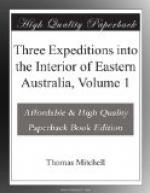DOG KILLED BY A SNAKE.
February 11.
On the march this morning we lost an excellent little watch-dog, named Captain, by the bite of a snake. While the other dogs with the party grew mere skeletons, Captain continued in good case, having fared very well on the rats, mice, bandicoots, etc. which he, under the direction of The Doctor, who shared the prey, had the sagacity to scrape out of the earth. Captain was also a formidable enemy to lizards, et hoc genus omne; but this morning his owner found him engaged with that venomous reptile known in the colony by the name of deaf-adder, and although compelled instantly to let it go, it was too late, for poor Captain stretched out his legs and expired on the spot, having been already bitten by the poisonous reptile.
BIRDS NESTS.
We repassed this day the place where only I had seen that bush of the interior, the Stenochilus maculatus. It grew to the height of about four or five feet, and we found the fruit and flower on the same twig. Numerous small birds with red bills flew about these bushes, and we found, slightly attached to the tender top-twigs, their tiny nests in great numbers, some containing eggs. No instinctive sagacity, such as we perceive in birds elsewhere, to conceal their nests, was here apparent, nor was it required; but such nests must have fallen an easy prize even to very little boys, had there been any; so that the security these birds enjoyed seemed truly characteristic of the desert and absence of birds of prey.
The party arrived at the old camp by Pelican Ponds early in the day. Here, as the men were growing weak, I found it necessary to restore to them the full allowance of rations, especially as they could no longer derive any support from the hope of making great discoveries, for no travellers could have felt more zealous in the cause than these poor fellows had done throughout the journey.
February 12.
Our way to the next encampment was long, and great part of the ground full of holes, and unfavourable for travelling. Indeed, I considered it the worst portion of country intervening between us and the Liverpool range. This was precisely where the effect of rainy weather on the soil was to be most dreaded, and, after having been so long exposed to be cut off in these low levels from any higher ground by floods; the lowering character of the sky, now that we were about to emerge, only rendered me more impatient to see the hills again. We accordingly set off at a very early hour, and after travelling seven miles we halted for ten minutes to water the cattle at some ponds, where, as the weather was uncommonly warm, the men were also refreshed with some limejuice mixed with the water. The cattle came on very steadily afterwards, notwithstanding the heat.
NUNDEWAR RANGE.
The blue summit of Mount Riddell at length arose above the horizon, and was as welcome as the sight of land after a long voyage.




